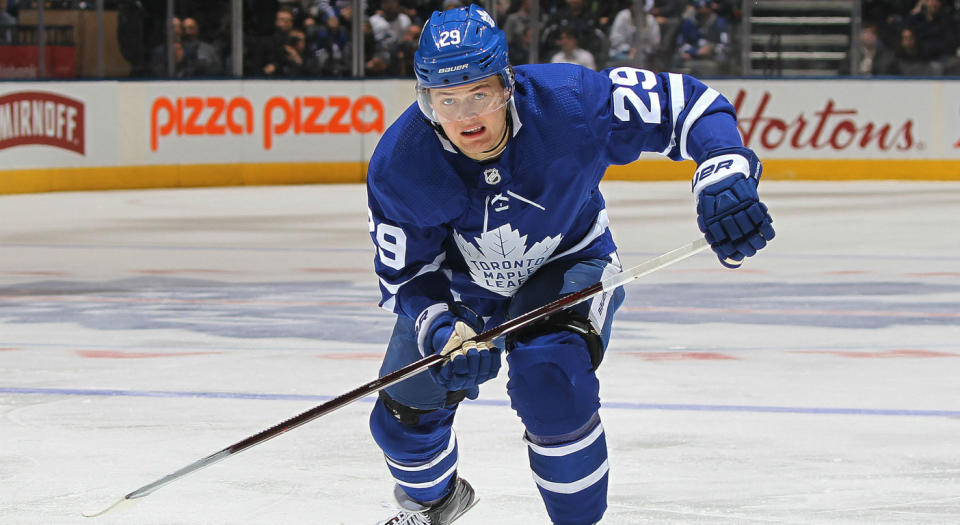How William Nylander might represent a positive shift for young talent
As we approach the Dec. 1 deadline for Toronto to re-sign Willy Nylander without him having to sit out the season, a couple things are becoming increasingly clear.
First and foremost, as reported by Elliotte Friedman on Hockey Night in Canada — and again in 31 Thoughts — neither side is especially far apart here. About $300,000 is the difference between what the team and player are willing to give on, and we’re mostly talking about a number in the $7 million range. No word on term, as far as I can tell, but you’d assume at that price point we’re not exactly talking about a bridge deal.
That has a lot of teams nervous, not the least of which is Toronto itself. The Leafs have a bit of a salary armageddon looming this summer, as we all know; Mitch Marner and Auston Matthews are both going to want what you’d call “Tavares money” or something in that neighborhood, and it ain’t gonna be easy to make $30 million plus the $7 million-ish for Nylander fit under a cap that should clear $80 million.
Now, if anything, other teams should be laughing at the Leafs’ misfortunes here (such as they are; having to spend too much money on too many good players is a problem few teams in this league face, and most would kill for). Not only does it put the team in a tough position moving forward but it might also shake loose some opportunities for trades — i.e. they might give you a good young player or a pick for a salary dump — so that’s a net positive, right?
Well, other teams see what Nylander is doing as a problem for their own books. This is a young guy who’s “holding out” and demanding what is basically UFA money for what the league writ large would see as RFA qualifications. And if Nylander wins here, that could set what teams would consider to be a bad precedent.
There are a lot of really good RFAs on expiring deals right now. All-Star type players, a few who are more complementary, but still very good and obviously on the uphill side of their aging curve.
Obviously very few of those guys are in Nylander’s strata — the Leafs holdout is basically a guaranteed 60-point player at age 22 — but if this move works for him (and it should, in theory) then it might give those high-end guys ideas. What if they *gasp* also ask for the money they would be due as UFAs while they’re still RFAs? And what if they don’t just take whatever scraps their teams give them as a temporary appeasement, as Karlsson already did this summer?

Because if, say, the Flames suddenly have to start budgeting for Tkachuk to be a big earner at age 21, that might limit Brad Treliving’s ability to give, oh I don’t know, a 31-year-old winger $5.75 million for five years in the same summer as he buys out a 33-year-old he signed two summers ago for $4.5 million over five years.
I know it’s a crazy idea in the NHL but for me it’s one of those things: “You should pay your great young players who are still improving more than you pay your old, good players who are in decline.” Teams don’t want to have to think like that because they often commit so much money to those guys they’re signing in their late 20s and early 30s.
Let’s put it this way: Between Kyle Connor and Matt Duchene, who do you think is going to be better over the next, say, six years? And how close do you think their AAVs and terms will end up being?
One gets the feeling NHL teams will defer to Duchene’s experience and track record instead of Connor’s much shorter resume of similarly strong success. Since the start of last season, Connor has 81 points in 98 games (0.83 per) versus Duchene’s 89 in 106 (0.84 per). Duchene is also a center, while Connor is a wing, and obviously the entire restricted free agency system is built to depress costs because teams will never offer-sheet someone. When you don’t have to worry about other bids, it’s easier to turn your pockets inside out to guys who want a bigger piece of the pie.
Another group that would likely be horrified if young guys start getting paid what they deserve: Veterans. Guys who didn’t cash out or who, like Duchene, took a hometown discount when they were RFAs would see it as some sort of betrayal that their successors actually started getting paid commensurate to their contributions.
There are only so many cap dollars to go around, so it would be galling to long-time players to see young bucks say, “actually, pay me instead of that guy who’s only going to decline over the life of the deal you would have given him.” Especially because all the vets who might have otherwise sought big contracts from, say, Carolina, Colorado, or Columbus this summer would, with all apologies to Arn Anderson, find their “spots” harder to come by.
Nylander is doing what he should do: Maximizing his earning potential even if no one before him ever really did the same to this extent. The second he signs, people are probably gonna call him selfish. It might follow him around for the rest of his career.
But Nylander realizes what few others have. “You have to understand this is a business” usually only cuts against the players when they want something. Everyone else in this league should follow his lead and make that a two-way street.
Ryan Lambert is a Yahoo! Sports hockey columnist. His email is here and his Twitter is here.
All stats via HYPERLINK “http://corsica.hockey/”Corsica unless otherwise noted.

 Yahoo Sports
Yahoo Sports 

